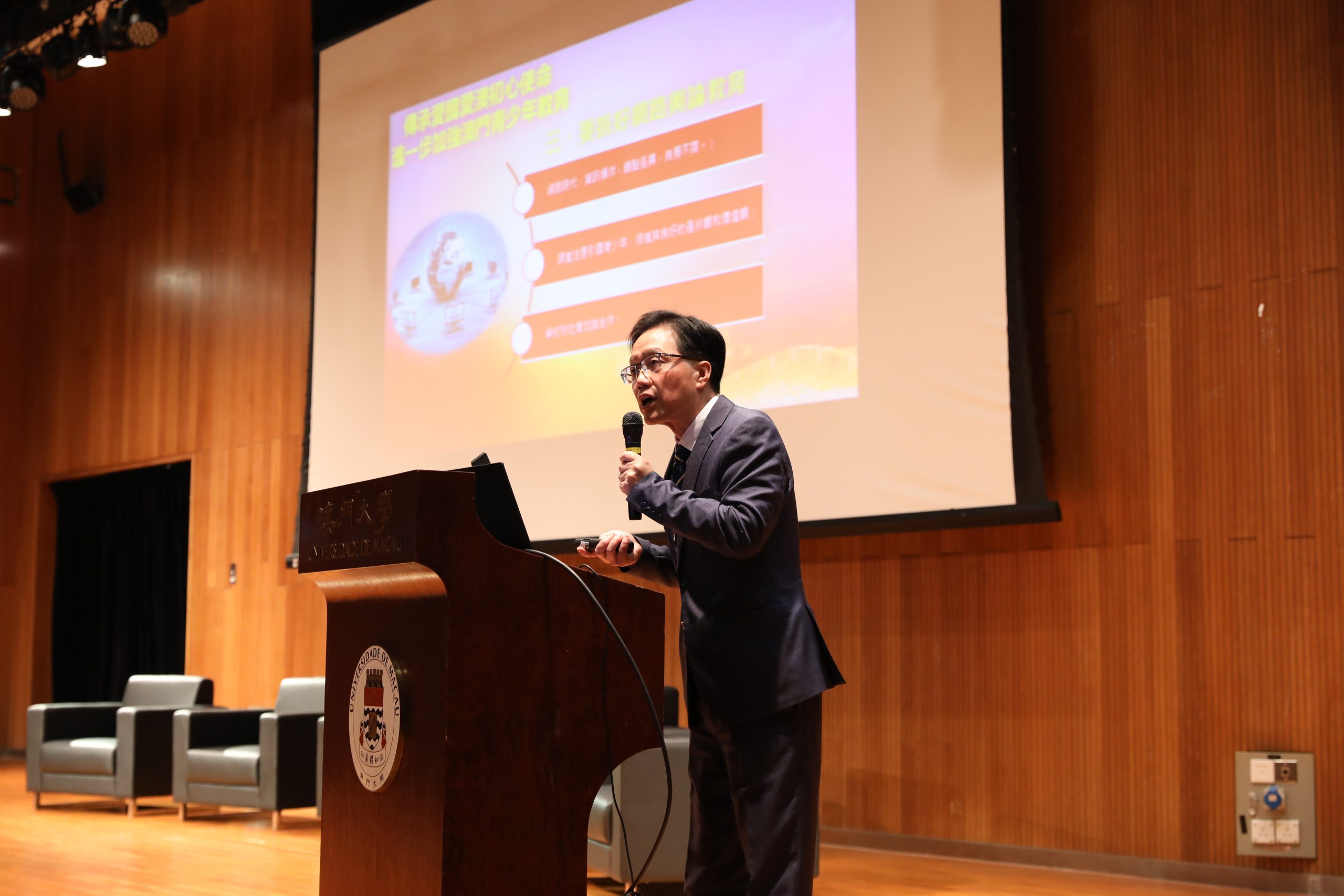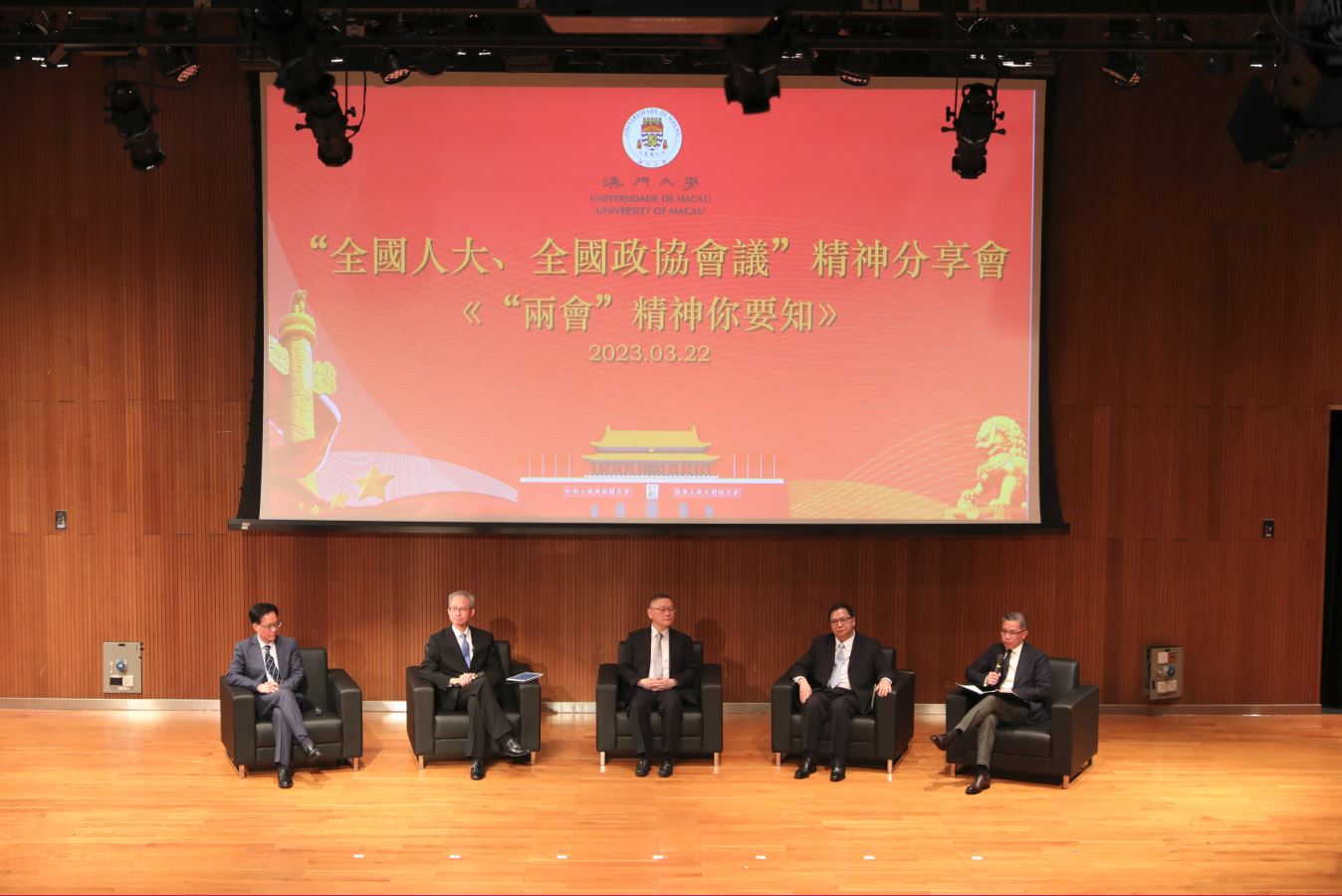UM invites NPC deputies and CPPCC National Committee members to share core messages of ‘Two Sessions’ with faculty members and students
澳大邀人大政協向師生分享“兩會”精神
為讓師生學習、準確理解、堅決貫徹二十大精神,把全國人大、全國政協會議的決策部署轉化為實際行動,澳門大學舉辦兩會精神分享會——“兩會”精神你要知活動,邀請了第十四屆澳區全國人大代表崔世平和黃顯輝、全國政協委員會委員邱庭彪和高錦輝作主講嘉賓,與師生們分享今屆兩會的主要內容和精神要點,師生們反應熱烈,全場爆滿。
崔世平重點分享了“兩會密碼”,介紹了國家發展現況和目標,包括創造就業崗位、穩定經濟和失業率、以及維持糧食產量。崔世平亦談及科技範疇,提議將澳門打造成爲中國智慧科技研發成果的體驗中心,進一步用好澳門“中葡平台”優勢,促進澳門融入國家發展大局,推動澳門金融發展,建立科技與文化深度融合。
黃顯輝指出,推進強國建設離不開保持香港、澳門的長期繁榮穩定,全面準確貫徹“一國兩制”方針。澳門“一國兩制”事業取得一系列突破性成果,中央將繼續支持澳門推動經濟適度多元發展,促進橫琴粵澳深度合作區的建設和發展;並介紹了《中華人民共和國立法法》的設立,以及相關的完善和修改工作。
邱庭彪指出,是次政協會議的核心精神包括:強調習近平時代中國特色社會主義思想、以中國式現代化全面推進中華民族偉大復興、堅持和完善中國共產黨領導的多黨合作和政治協商制度,加強對外友好交往,以推動構建人類命運共同體、以及政協委員應當要認真學習、自覺遵守政協章程,為全面推進中華民族偉大復興而團結奮鬥。
高錦輝指出,《政府工作報告》為澳門教育工作指明方向,強調要深入貫徹黨的二十大精神,促進教育高品質發展,以促進教育界最廣泛的團結、促進青少年文化的認同、抓好網路輿論的教育、以及加強與內地的教育與交流來實現傳承愛國愛澳使命,加強澳門青少年教育;並提案“大學生村官”延伸至內地就讀的澳門大學生。
會上,澳大副校長莫啓明教授作為主持人,與嘉賓們就青年人的生涯規劃、融入灣區、憲法和澳門基本法推廣等話題作即場交流。高錦輝寄語青年人要做好人生規劃,融入國家很重要,應在職業生涯上裝備自己,把握機會到灣區發展。崔世平鼓勵學生親身到內地學習,了解和體驗當地文化;同時可考慮先嘗試到內地工作,再考慮創業,他勉勵同學要勤奮學習和工作。黃顯輝指青年人要認識和重視“總體國家安全觀”,要確保“一國兩制”成功實現,就要維護國家安全,國家才能和平發展。邱庭彪指澳門各界人士都十分支持澳門國安法的修訂和完善工作,這是一個很好的推廣和教育過程;另一方面大學積極透過研究工作和編輯書籍,讓港澳青年人更好地了解國安法。
出席分享會的澳大成員還有澳大校董會主席林金城、校長宋永華、學生事務長彭執中、校董會秘書長梁佳俊、校長辦公室主任汪淇、各書院院長、部門主管等。
The University of Macau (UM) recently held a sharing session to deliver the core messages of the annual sessions of the 14th National People’s Congress (NPC) and the 14th National Committee of the Chinese People’s Political Consultative Conference (CPPCC) to faculty members and students to ensure a correct understanding of the messages among them. Speakers invited to share the key takeaways from the ‘Two Sessions’ included NPC deputies Chui Sai Peng and Vong Hin Fai, as well as CPPCC National Committee members Iau Teng Pio and Kou Kam Fai. The event attracted a full-house audience.
Chui shared China’s economic outlook and strategies to achieve its growth target, including creating jobs, stabilising the economy, and reducing the unemployment rate. In terms of science and technology, he suggested launching an experience centre in Macao to showcase China’s R&D achievements and that Macao should step up efforts to strengthen its role as a platform between China and Portuguese-speaking countries, so as to align with national strategies, promote Macao’s financial development, and facilitate the integration of technology and culture.
Vong emphasised that ensuring long-term prosperity and stability in Hong Kong and Macao is essential to promoting national rejuvenation, adding that the ‘One Country, Two Systems’ policy should be upheld steadfastly and Macao already achieved a series of breakthroughs in the implementation of the policy. According to him, the central government will continue to support Macao in promoting adequate economic diversification and facilitating the development of the Guangdong-Macao In-depth Cooperation Zone in Hengqin. He also talked about the ‘Legislation Law of the People’s Republic of China’, as well as the related improvements and amendments.
Iao said that the core messages of the CPPCC session include emphasising the Xi Jinping Thought on Socialism with Chinese Characteristics for a New Era, promoting the great rejuvenation of the Chinese nation through a Chinese path to modernisation, upholding and improving the multi-party cooperation and political consultation system under the leadership of the Communist Party of China, and strengthening friendly exchanges with foreign countries to promote the creation of a community with a shared future for mankind. According to him, CPPCC members should earnestly study and abide by the CPPCC Constitution and work in unity to promote the great rejuvenation of the Chinese nation at all fronts.
Kou pointed out that the Government Work Report provided a direction for Macao to develop its education sector, emphasising the need to thoroughly implement the instructions from the 20th National Congress of the Communist Party of China and promote high-quality development. In terms of education reform, he suggested enhancing the youth’s sense of national identity, improving online public opinion education, and strengthening education and exchanges with the mainland to promote patriotism and the love for Macao among adolescents and their education. He also proposed extending a national programme to select college graduates to work as village officials to Macao university students studying in mainland China.
As the moderator of the event, UM Vice Rector Mok Kai Meng exchanged ideas with the guests on how young people in Macao should plan their careers and prepare themselves for job opportunities in the Greater Bay Area. They also discussed the promotion of the constitution of China and the Basic Law of Macao SAR. Kou advised young adults to equip themselves for career development and seize the opportunity to integrate into national development, such as pursuing a career in the Greater Bay Area. Chui encouraged students to study in mainland China and experience the culture for themselves. They should also consider working in mainland China before starting their own businesses. Vong pointed out that young adults should understand and respect the holistic view of national security to ensure the implementation of the ‘One Country, Two Systems’ policy and safeguard the development of the country. Iao said that members of all sectors of Macao are very supportive of the revision of the National Security Law of Macao, adding that the revision is a very good promotion and education process. He added that UM is actively engaged in research work and editing books to enable young people in Hong Kong and Macao to better understand the national security law.
Participants in the sharing sessions also included Lam Kam Seng, chair of the University Council of UM; Yonghua Song, Rector of UM; Pang Chap Chong, Dean of Students of UM; Leung Kai Chun, Secretary-General of the University Council of UM; Wong Kei, Director of Rector’s Office; as well as residential college masters and department heads.






